The Lancet has not questioned the Russian data vaccine, a group of experts has done so
The Lancet published a letter in which a group of scientists raise up their doubts about Sputnik V, but it does not represent a consensus opinion from the journal as a such

You have sent us a news from Infobase whose headline suggests that the prestigious journal The Lancet has questioned its own conclusions about the Russian covid-19 vaccine Sputnik V, whose efficacy and safety results were published in February in an article verified by the scientific community. This is MISLEADING. The Lancet published on 12 May a letter entitled “Data discrepancies in the deficient reporting of preliminary data from the Sputnik V phase 3 trial”, in which a group of scientists raise up their doubts about the article published in February, but this text does not represent a consensus opinion from the journal as a such.
"The same scientific publication that gave scientific endorsement and public legitimisation (…) to the Sputnik V vaccine against covid-19 now raises objections to the supporting scientific data and considers them insufficient and non-transparent"
The letter questions some elements of the article in which The Lancet recognised that the Sputnik V had a proven efficacy of 91,4%, a datum confirming what Russian authorities had already previously announced. Now, “several experts have found problematic data in the results of phases 1 and 2”. Moreover, the experts ensure “to have performed multiple independent applications to access the raw dataset, but were never answered”, the authors explain, who ask for the revision of the data. The “concerns” of these scientists are related with the lack of available information, the lack of clarity about the protocol applied in the study phases and inconsistency in some data.
“Such letters are part of the scientific debate and process, and in general they are a good signal”, Adelaida Sarukhan, an immunologist and science writer at the Institute for Global Health (ISGlobal, in Catalan) in Barcelona, explains to Verificat. “Yes, indeed, inconsistencies in the data are confirmed or the authors still refuse to make the data publicly opened, then it will correspond to The Lancet journal to take the appropriate measures”, she says.
Three problems
The group of scientists sets out three problems in his letter, concerns related to the results of phases 1 and 2 (safety and immunogenicity) and 3 (efficacy). The first one has to do with the lack of access to the data that Russian scientists have used to extract their conclusions. In this sense, the experts ask for more transparency.
The second problem is related to the introduction of three additional analyses to the study they had presented the last November on which the efficacy of Sputnik V is based and which are not listed on ClinicalTrials.gov, the register of clinical trials of the US Government, considered as a reference in the field of scientific investigation. For example, one of the doubts has to do with how the participants suspicious of suffering from covid-19 were evaluated in the investigations. The letter alleges, for example, a lack of information about the clinical parameters that determined who presented evidence of being infected, what diagnostic protocols were used, when PCR tests were performed or how many amplification cycles were used.
“The way in which the suspicious cases were defined could have given place to a bias in the PCR proofs used to evaluate the number of covid-19 confirmed cases, which is crucial for the determination of its efficacy”, they underlie. Moreover, the experts highlight an incoherence about the number of people who participated in the clinical trial. The investigation informed that 35963 people received the candidate formula and another 21997 randomly received the vaccine or a placebo, but in the official register in ClinicalTrial.gov only 33758 appeared.
The third problem is associated with an incongruence with the data collected during the monitoring process: more people appeared on day 20 after vaccination than on day 10. “With such inconsistencies, we question the accuracy of the reported data, they conclude.
Almost 70 countries use Sputnik V
Sputnik V is administered in two doses which are applied with 21 days of difference and is currently being used in almost 70 countries, mostly in Asia, Latin America and Africa. The European Union and the United States have not authorised its use.